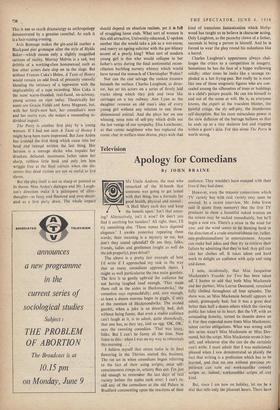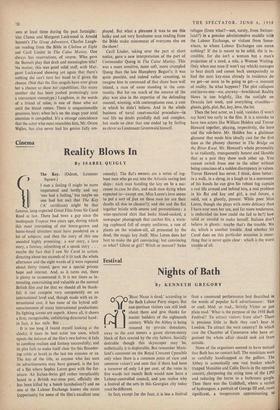Television
Apology for Comedians
By JOHN BRAINE MY Uncle Andrew, the man who -1111 remarked of the H-bomb that - someone was going to get lamed with that thing, has a formula for good health, physical and mental : \'A Hail Mary each day and keep the bowels open.' Isn't that amus- ing? Alternatively, isn't it wise? Or don't you find it anything but tasteless? All right, then; I'll try something else. 'These stones have digested elegance.' I awoke yesterday repeating these words; their meaning is a mystery to me, but don't they sound splendid? Or are they, folks, friends, ladies and gentlemen (might as well do the job properly), pure drivel?
The above is a pretty fair example of how I'd write if I approached my task in the way that so many comedians approach theirs. I might as well particularise the two main gambits. The first is to gently upbraid the audience for not having laughed loud enough. 'That made them roll in the aisles in Heckmondwike,' the comedian says reproachfully; and, sure enough, at least a dozen morons begin to giggle, if only at the mention of Heckmondwike. The second gambit, when a joke is so drearily bad, daft without being funny, that even a studio audience can't laugh at it, is to admit, quite shamelessly, that one has, as they say, laid an egg. 'OK, OK,' says the sweating comedian. 'That was lousy, folks. But I can't be funny all the time. Now listen to this : when 1 was on my way to rehearsals this morning . .
I believe myself that steam radio in its final flowering in the Thirties started this business. The rot set in when comedians began referring to the fact of their using scripts; once self- consciousness creeps in, artistry flies out. I'm just old enough to remember the last days of real variety before the nudes took over; I can't re- call any of the comedians at the old Palace in Bradford commenting upon the reactions of their audience. They wouldn't have escaped with their lives if they had done.
However, even the tenuous' connections which -TV variety has with real variety may soon be severed. In a recent interview, Mr. John Irwin said (I quote from memory) that the first TV producer to show a beautiful naked woman on the screen may be sacked immediately, but he'll begin a new era. There's a straw in the wind for you; and the wind seems to be blowing hard in the direction of a crude amateurishness (or, rather, non-professionalism) in entertainment. Anyone can make bad jokes and then try to retrieve their failure by admitting that they're bad. Any girl can take her clothes off. It takes talent and hard work to delight an audience with quip and song and dance.
I note, incidentally, that Miss Jacqueline Mackenzie's Trouble for Two has been taken off. I hasten to add that. both Miss Mackenzie and her partner, Miss Lorrae Desmond, remained fully clothed throughout all four episodes. The show was, as Miss Mackenzie herself appears to admit, grotesquely bad; but it was a great deal better than half a dozen others which the viewing public has taken to its heart. But the VP, with an astounding ferocity, turned its thumbs down on it. For they expected more from Miss Mackenzie; talent carries obligations. What was wrong with this series wasn't Miss Mackenzie or Miss Des- mond, but the script. Miss Mackenzie wrote it her- self, and whatever else she can do she certainly can't write. I must admit that I was maliciously pleased when I saw demonstrated so plainly the fact that writing is a profession which has to be learned, and that no one without previous ex- perience can turn out workmanlike comedy scripts or, indeed, workmanlike scripts of any kind.
But, since I am now on holiday, let me be a dial that tells only the pleasant hours. There have )een at least three during the past fortnight: Alec Chines and Margaret Lockwood in Arnold Bennett's The Great Adventure, Charles Laugh- ton reading from the Bible in Chelsea at Eight and Cecil Linder in The Caine Mutiny. One always has reservations, of course. Who gave the Bennett play that drab and meaningless title? No matter; this was good solid stuff, with Mar- garet Lockwood showing yet again that there's nothing she can't turn her hand to if given the chance. (Not that the film moguls have ever given her a chance to show her capabilities; like many another she has been pushed protestingly into a convenient stereotype.) Laughton, in the words of a friend of mine, is one of those who act until the blood comes. There is unquestionable greatness here; when he's on the stage your total attention is compelled. It's a strange coincidence that the actor who most resembles him, Mr. Orson Welles, has also never had his genius fully em- ployed. But what a pleasure it was. to see this bulky and not very handsome man reading from the Bible make mincemeat of everyone else on the show !
Cecil Linder, taking over the part at short notice, gave a new interpretation of the part of Commander Queeg in The Caine Mutiny. This was a more sensitive, more soft, more crumpled Queeg than the late Humphrey Bogart's; it was quite possible, and indeed rather consoling, to imagine him in command of that shore base well inland, a man of some standing in the com- munity. But for me much of the interest of the play was also in the expertise of the defending counsel, winning, with contemptuous ease, a case in which he didn't believe. And in the whole business of naval court-martial procedure—in real life no doubt painfully dull and complex, , but made so clear that one ended up by feeling as clever as Lieutenant Greenwald himself.











































 Previous page
Previous page